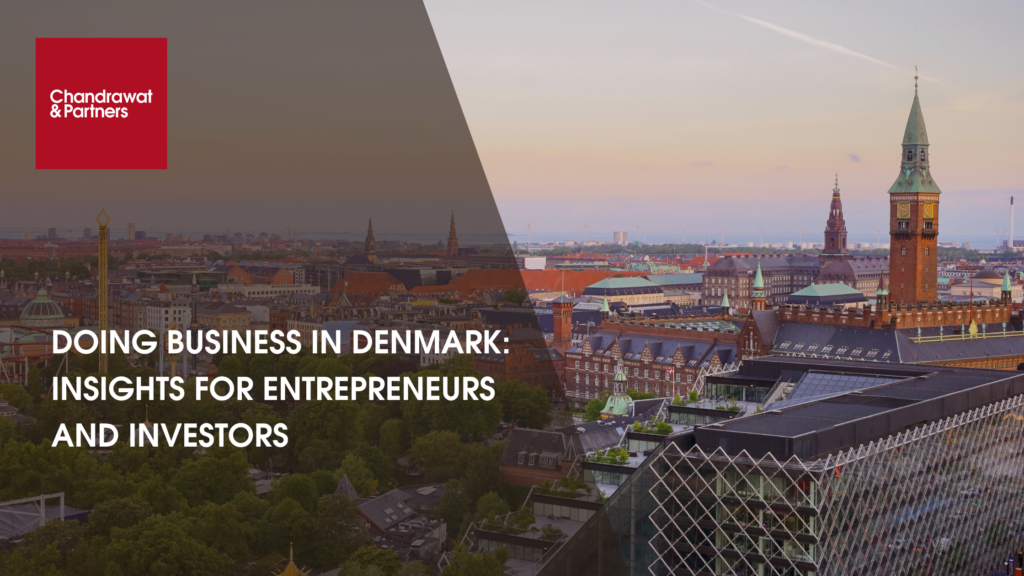
December 06, 2024
DOING BUSINESS IN DENMARK: INSIGHTS FOR ENTREPRENEURS AND INVESTORS
INTRODUCTION
Denmark, often known for its outstanding performance in Development Indices, transparent business environment, and a crucial strategic location in Europe, offers a fertile landscape for businesses to expand their footprint in the Nordic region. It has a flexible labour market, reliable supplies of electricity and water, and a very-well developed financial system.
UNDERSTANDING DENMARK'S ECONOMIC LANDSCAPE
Denmark boasts a highly developed economy characterized by a mix of free-market capitalism and comprehensive welfare measures. Key industries include pharmaceuticals, renewable energy, food processing, and maritime shipping. With a population that prioritizes sustainability and innovation, businesses that align with these values often find success. In World Bank’s Ease of Doing Business Rankings, the country has consistently held a position within the top-5 globally, and has been the lead representative of Europe.
OPPORTUNITIES IN DENMARK
- Renewable Energy: Denmark being a global leader in green energy, offers a lucrative market for investments in the renewable energy sector and sustainable technologies.
- Tech Innovation: Denmark’s thriving technology ecosystem supports startups in Artificial Intelligence (“AI”), software development, fintech, and biotechnology.
- Agribusiness: Demark has been a well-known hub for food innovation and high-quality agricultural export products.
DENMARK’S STRATEGIC LOCATION TO FACILITATE GLOBAL TRADE
Denmark’s geographic position at Northern Central Europe makes it a hub for global trade and logistics. It has access to North Sea and Baltic Sea and acts as a bridge to Sweden, Norway, and Finland, as well as the emerging Baltic economies. Denmark is a part of the European Union (“EU”), giving businesses seamless access to a market of over 450 million consumers. Danish shipping companies operate extensive fleets, connecting over 120 countries and ensuring reliable international logistics solutions.
LEGAL FRAMEWORK AND BUSINESS SETUP
With government support and transparent regulations, starting a business in Denmark is a straightforward process. It typically takes one or two weeks to register a foreign company in Denmark. However, there is a minimum requirement of a share capital of DKK 40,000 to establish a Private Limited Company in Denmark.
STEPS TO ESTABLISH A BUSINESS
- Choose a Business Structure: Options include sole proprietorship, limited liability company (“ApS”), or public limited company (“A/S”). Foreign investors often prefer the ApS for its flexibility.
- Register Your Business: Register with the Danish Business Authority via their online portal.
- Tax Registration: Obtain a Value added tax (“VAT”) number for tax compliance.
- Bank Account Setup: Open a Danish bank account to manage financial transactions.
- Employment Compliance: Follow Denmark’s labour laws, including employment contracts and social security contributions.
TAXATION IN DENMARK
Denmark’s tax system is efficient and transparent, with rates aimed at funding its comprehensive public services. Key considerations include:
- Corporate Income Tax: Set at 22%, the CIT is competitive within Europe.
- Value-Added Tax (“VAT”): Standard rate of 25% is applicable to most goods and services.
- Personal Income Tax: Progressive rates go up to 52.07%, with reductions for expatriates under specific schemes.
LABOUR LAWS AND EMPLOYMENT PRACTICES
Denmark emphasizes employee rights, fostering a collaborative workplace culture. Employers should comply with the standard 37-hour workweeks. Collective Bargaining Agreements (“CBAs”) which are agreements between employers and labour unions, are common across various industries. Additionally, it has a strict policy for providing compulsory parental leave and promoting gender parity.
NAVIGATING CHALLENGES
While Denmark offers a favourable business environment, challenges include high labour costs and intense market competition. Mitigating these requires strategic planning and leveraging Denmark’s innovation-focused infrastructure.
CONCLUSION
Denmark’s dynamic economy, transparent governance, and commitment to sustainability create a conducive environment for business growth. Entrepreneurs and investors who integrate into the local ecosystem, respect cultural nuances, and align their offerings with Denmark’s forward-looking ethics will likely achieve success.
HOW WE CAN HELP?
- Our team of experts will guide you through the process of setting up a business in Denmark, ensuring compliance with all requirements, including registration, licensing, and tax obligations.
- Our team offers specialized advice to help establish successful businesses in emerging and popular sectors like Agribusiness, Pharmaceuticals and FinTech.
- We provide valuable insights into regulatory changes and offer guidance on navigating these shifts while minimizing potential risks.
For more information or queries, please email us at
enquiries@chandrawatpartners.com
Key Contact

Surendra Singh Chandrawat
Managing Partner

